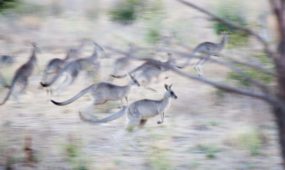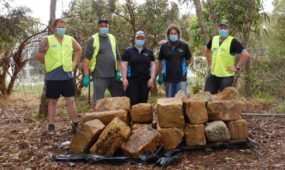Organic Growth: Tim Marshall
Environment
DEMAND for organic produce has boomed in recent years as consumers become increasingly aware of their food source, yet the notion of organic food production predates the current interest by several millennia.

Sign up to receive notifications about new stories in this category.
Thank you for subscribing to story notifications.
Tim Marshall, deputy chair of the Organic Federation of Australia and director of TM Organics points out that not only does the majority of the world’s population continues to be fed by organic agriculture but Indonesia’s Javanese home gardens have been highly productive and sustainable for 3,000 years.
“The most productive food systems in the world are small scale mixed home gardens,” Marshall says. “About half the world runs an organic system of food production with small farms on less than a hectare of land that produce more protein and carbohydrate per square metre than any other system. Some of these farms have a tremendous diversity of food with as many as 60 different varieties of plants.”
The International Federation of Organic Agriculture Movements (IFOAM) defines organic agriculture as ‘a production system that sustains the health of soils, ecosystems and people. It relies on ecological processes, biodiversity and cycles adapted to local conditions rather than the use of inputs with adverse effects.’
According to organic agricultural principles, holistic management of the agro-environment increases sustainability and long-term soil fertility while minimising pests and diseases without the use of synthetic products.
Though advocates of organic agriculture had been promoting their methods for many years, 2007 was a turning point in the history of the movement with the publication of Catherine Badgley’s research paper, ‘Can organic agriculture feed the world?’
“This research was an important validation,” Marshall says. “It confirmed that organic agriculture does have the capacity to feed the world, and even though the western system of energy intensive agriculture would experience a yield loss, when you look at worldwide systems, the average peasant farmer has the capacity to do much better with organic methods because they’re not stretching land and water resources.”
Since then, organic agricultural methods have gained substantial interest from international bodies such as the UN’s Food and Agriculture Organization which acknowledges its potential for increasing yields and improving food security.
New studies predict a 35 per cent increase in global food demand by 2025, with China and India constituting as much as 60 per cent of that growth. Marshall believes Australia has an important role to play in future food supply, particularly as demand for organic produce soars as a result of the rapid growth of Asia’s middle classes.
“Organic intensification’ means we can bring best practice from small scale agriculture to larger production systems,” he explains. “In Australia organic production is no longer about very small scale agriculture only – many of our larger corporate operators are now beginning to address the issue as demand continues to rise and I believe a lot of the technology used by organic farmers will find its way into conventional farming because conventional farmers now realise they must do a better job of looking after their soils.”
The organic market has grown from an estimated US$20 billion in 2001 to US$62.9 billion in 2011, and Australia is a world leader in organic agricultural land with 12 million hectares according to IFOAM.
Growing affluence has seen wealthier consumers in Asia place increasing scrutiny on the quality and safety of their food and Marshall believes the interest in organic Australian food will increase exponentially. “Food safety is becoming more important across Asia and we’re seeing a very healthy interest in organic food from China, Malaysia, Korea, Japan, Singapore and Hong Kong, with rapidly growing markets in Vietnam, Thailand and Indonesia,” he says.
“Australia is considered a world leader in food quality and safety because our production systems are efficient and very clean,” Marshall continues. “Organic products feature in high value display areas of supermarkets across the world. Whereas seven or eight years ago most organic production in Asia was intended for export to the west, there’s now huge growth in domestic markets, especially China.”
The biggest challenge for organic agriculture in Australia, Marshall believes, is providing adequate guidance on how to make the conversion to organic. Through his consulting work at TM Organics, Marshall has advised a broad range of producers, both in Australia and overseas, on how to make that conversion including large cooperatives such as the Floodplain Organic Grain Growers who have the largest contiguous certified cropping area in the world, the Organic Dairy Farmers Association and a number of large corporate wine producers.
“The issue of conversion is not straightforward,” he says. “The biggest challenge is the lack of information available which is why the formation of farmers’ cooperatives can be so vital in giving growers the opportunity to share information. By combining small producers into larger units, producers can also focus on larger markets and resolve any inconsistencies of supply. It would be enormously helpful to see more research conducted on conversion issues and how to run sustainable organic food production systems.”
Though the challenges are substantial, Marshall has seen several Australian producers overcome them with great success. “Most very large wine producers in Australia have organic and biodynamic options in their range now,” he says. “I believe the Mclaren Vale area in South Australia could become the world’s number one producer of organic wine in the world and we could easily realise this potential within a matter of years.”
He also predicts Australian fruit growers will be well-poised to capitalise on the increased demand for fresh organic produce. “There are not many large organic horticulture producers yet, but many larger producers are experimenting with organic plots for crops like apple, almond, avocado and mango and we can expect to see larger crops and more consistent supply in the future.”
This article originally appeared at Australia Unlimited.
Jump to next article



